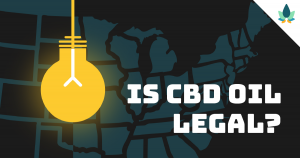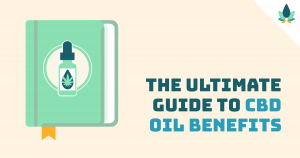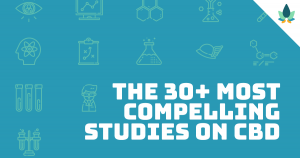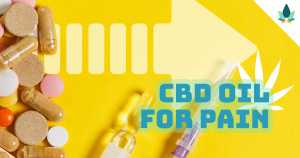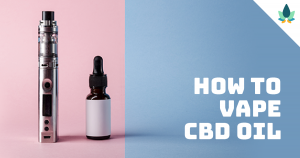If you’re here, you’ve probably noticed a bit of buzz surrounding CBD for anxiety and depression, especially as it relates to the way it interacts with anxiety and anxiety-related disorders.
Whether you’ve read a recent news article, heard a testimonial from a friend, or have been alerted to the possible benefits of this natural alternative to modern medicine, you probably have questions. You’ve come to the right place.
One of the most common questions we’ve heard about CBD oil (and other cannabis products) is whether or not it can truly help those suffering from anxiety.
The good news is, all signs point to yes!
CBD oil for anxiety has become a popular alternative to treatments that often cause as many effects as they treat! Because of its low risk of side effects and/or dependency (we’ll cover that a bit later), it might just be the optimal treatment or addition to “standard” treatments that anxiety sufferers have been hoping for.
Read on to learn more about how this natural treatment could help you move forward without the negative and sometimes debilitating effects of anxiety.
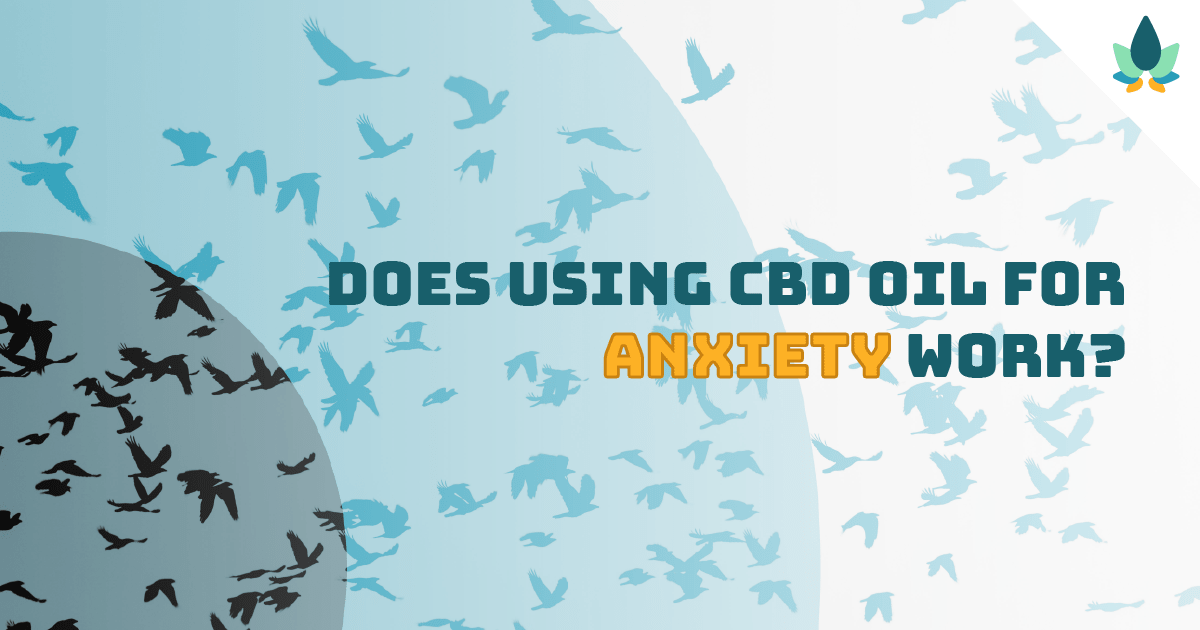
Check out our “CBD Oil for Anxiety” intro video (2min)
Why Could CBD Be The Better Way For Anxiety?
If you’re frustrated by the side effects or limitations of traditional anxiety medications, you’ve probably started looking into alternatives. Perhaps something more natural.

For proof, science, and other reasoning, read on.
What Is CBD Oil?
Let’s start at the beginning: what is CBD oil in the first place? For a detailed guide on cannabidiol, start here.
As an overview, CBD stands for cannabidiol, which is a type of cannabinoid. A cannabinoid is a chemical that naturally occurs in the cannabis — or hemp — plant. This is where many reservations and concerns start to come to life. Is it the same as marijuana? Is CBD just a masquerade for weed?
No. And here’s why.
Traditional marijuana contains multiple cannabinoids, including both CBD and THC — which is responsible for the “high” associated with its use. When CBD is isolated from the cannabis plant, containing less than .3% THC, it cannot produce a high. It is not psychoactive.
Cannabis plants produce over 400 chemical compounds, 60 of which can only be found in those plants: cannabinoids. CBD happens to be the second-most prevalent cannabinoid and has started to show its own benefits, separate from traditional medical marijuana altogether and without the high. That’s right, the effects of cannabidiol are minimal while the benefits as a treatment of multiple medical conditions are enormous.

PUT SIMPLY:
CBD is a natural compound originating in the cannabis plant that can be completely isolated from psychoactive compounds like THC.
How CBD Oil Works For Anxiety Sufferers
CBD interacts with and regulates the endocannabinoid system, which is responsible for regulating balance in the human body. It plays a role in a variety of critical functions like sleep, immune responses, mood control, and more. When body systems are balanced, good things happen.
Because anxiety often stems from chemical imbalances that are beyond an individual’s control, finding a natural remedy can be a challenge. This is where CBD shines.

CBD is a 5-HT1A agonist. In case the term is unfamiliar, 5-HT1A is a serotonin receptor, often targeted by SSRIs, a common medication group used to treat anxiety and anxiety-related disorders. SSRIs help block the absorption of serotonin in the brain, increasing the brain’s ability to transport even more signals, reduce anxiety, and boost overall mood.
In a similar fashion, CBD can boost signals to serotonin receptors, increasing the transmission of 5-HT1A and possibly affecting mood faster than traditional SSRIs without the side effects and unpleasantries associated with the medications.
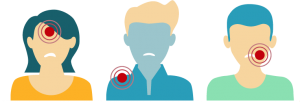
What About When Anxiety Causes Pain?
Sometimes anxiety is not a standalone disorder; in some cases, it stems from chronic pain.
In fact, those suffering from anxiety and/or depression are more likely to experience chronic, longer-lasting, more severe pain than non-sufferers. The pain-anxiety connection is well-documented and a part of life for many individuals. (1)
In these cases, many patients are forced with the decision to treat the symptoms of pain or anxiety, or to face a double risk as it relates to medication adverse effects — those that are related to anti-anxiety medications and pain medications.
There may be a better way.
CBD Also Helps Pain Sufferers
CBD may not be an officially classified “wonder drug,” but, perhaps that classification wouldn’t be too far off.
In addition to the documented anti-anxiety properties of CBD, the compound has been shown to reduce inflammation and the resulting pain in the human body. That’s right: CBD can help reduce pain and anxiety.
While studies are limited due to the official classification of marijuana as a Schedule I substance in the U.S. and common misconceptions about the supplement — see the next section for more information on this — research has begun to highlight the benefits of CBD oil for those suffering from and living with anxiety and anxiety-related disorders.
In a 2013 study published in the British Journal of Clinical Pharmacology, CBD demonstrated numerous benefits — many similar to medications used to treat generalized anxiety disorders — including acting as an anti-inflammatory, anticonvulsant, anxiolytic, antipsychotic agent, and more. Other studies, mostly performed outside of the US, have shown the same effects.(2)
For general anxiety disorder, the National Institute on Drug Abuse has performed and published clinical trials and studies that have demonstrated CBD’s stress-relieving properties in animals, along with fewer behavioral signs of anxiety.
Furthermore the World Health Organization — or WHO — has stopped short of classifying it as a medication, but states there is no evidence of the potential for abuse or harm stemming from the use of legitimate, pure CBD oil. That’s right, there are very few negative effects of CBD oil!

Anxiety: You Are Not Alone
If your anxiety diagnosis is new, or, if you’re wondering if you might be suffering from a related disorder, you’re not alone. In fact, it’s so common that one of the top benefits people look for is CBD for anxiety and depression. Here, of course, we’re focusing on anxiety. Anxiety, a disorder that truly affects daily functioning and living, isn’t talked about as much as it probably should be.
If you’re suffering, it’s important to understand that anxiety is more common than you might think. It’s more than needing stress relief or a break. In fact, the National Institute of Mental Health claims that over 18% of American adults suffer from anxiety, while other sources estimate that number may be closer to 30%. (3)
This means that somewhere between 1 in 5 and 1 in 3 adults must function through this disorder on a daily basis.
In a recent study, 24 people with social anxiety disorder received 600 mg of CBD oil or a placebo before taking a public speaking test.
The group that took CBD had substantially less anxiety, cognitive impairment, and distress in their speech, along with a lower heart rate, compared to the group that took a placebo. (4)
Because of how common the disease is, it’s also costly. A recent study found that disorders that fall under the spectrum of anxiety cost the country over $42 billion each year — that is around one-third of the total amount spent on mental health each year. These costs include healthcare services, prescriptions, hospitalizations, and other related treatments.
Anxiety In America

While the term “anxiety” is commonly intertwined with “stress”, it’s more than that. It makes daily life difficult and can be completely debilitating. In fact, according to the same study, individuals suffering from anxiety are much more likely to go to the doctor (3-5 times more likely) and to be hospitalized for psychiatric treatment (6 times more likely).
Together, these statistics paint a serious picture: anxiety is the number one mental health issue in the United States. It. Is. Serious. (5)
With That In Mind, What Has Your Experience In Dealing With Or Treating Anxiety Been Like?
While many individuals do not seek out treatment for anxiety — which often leaves them feeling helpless, alone and induce thoughts of failure, those who do seek treatment, often face similar feelings.
That’s because modern medicine comes with inherent limitations.
TO BEGIN, NO FORM OF ANXIETY IS EXACTLY LIKE ANOTHER. There are multiple conditions under the anxiety umbrella, including:
- Generalized anxiety
- Panic disorder
- Social phobia
- Obsessive-Compulsive Disorder (OCD)
- Phobias
- Generalized social anxiety
- Anxiety with Depression
- Post-Traumatic Stress Disorder
Each of these has a wide range of variables and levels of daily life impairment, from minor to severe. No condition is exactly like another.
TO TREAT THIS MYRIAD OF ANXIETY CONDITIONS, multiple medications may be used, which include:
- Benzodiazepines
- Beta Blockers
- Tricyclic Antidepressants
- General Antidepressants
- Monoamine Oxidase Inhibitors (MAOIs)
- Selective Serotonin Reuptake Inhibitors (SSRIs)
- Serotonin-Norepinephrine Reuptake Inhibitors (SNRIs)
- Tranquilizers
- Anticonvulsants
- And more
Each of these potential treatment options is used on their own or in combination with others to find the dosage and schedule that works for each individual patient. The process can take months or even years, requiring constant monitoring should any conditions change or a dosage requires adjusting. During this time and even after the correct treatment is prescribed, many side effects may present themselves.
Common Side Effects of The Medications Used To Treat Various Anxiety Disorders Include:
Sleepiness / Drowsiness
Dizziness / Vertigo
Poor Balance
Lack of Coordination
Concentration and Memory Difficulties
Slurred Speech
Upset Stomach / Digestion Issues
Headaches
Confusion
Blurred Vision
Those side effects? They’re considered common and less severe than more serious side effects. Of more concern to those considering traditional anxiety treatments are the potential for negative interactions with other substances and the difficulty changing medications or removing treatments should the need arise.
Let’s dig in.

Many anxiety medications come with serious warnings about interactions with other substances.
While considered generally “safe” when taken according to manufacturer instructions, they can be dangerous — sometimes even deadly — when combined with:
- Alcohol
- Pain Medications
- Sleeping Pills
- Common over-the-counter drugs, like antihistamines
- Antidepressants
This means that a serious lifestyle change may be necessary, along with the acknowledgement of the common aforementioned risks, before beginning a new medication regimen to treat anxiety.
These effects? They fail to take into consideration the problem associated with discontinuing treatment, switching medications or lowering doses: withdrawal.
Many of the most commonly prescribed anti-anxiety medications lead to dependence, which means users must take a larger dose to continue to realize the benefits. When it’s time to change the routine, or to try something else, coming off of the medications can have major side effects that include:
Anxiety Medication Side Effects
CARDIAC SYMPTOMS
A pounding heart, excess sweating
NEUROLOGICAL EFFECTS
Seizures
INCREASED ANXIETY
Along with physical symptoms, like restlessness
DEPRESSION
Along with confusion and difficulty with daily functions
INSOMNIA
Along with confusion
Each of these symptoms is similar to the withdrawal from other addictive substances and serious. This could lead to the need to continue medication simply to avoid the negative symptoms associated with a change, or, in the return or worsening of the original anxiety condition.
It’s clear: beginning a traditional treatment plan for anxiety-related conditions requires serious consideration of current symptoms and future potential problems.
CBD may just shine as a better alternative to health benefits in a more natural way; when considering what it is, how it interacts with the body, and its low rate of side effects!
Why Isn’t CBD Oil More Commonly Used For Anxiety?
Research demonstrates the proven abilities of CBD to decrease anxiety among sufferers.
In fact, in Brazil, researchers performed a study of patients suffering from anxiety. In addition to patient reports of a large decrease in anxiety-related symptoms, brain scans demonstrated blood flow patterns that matched those of patients treated with traditional medications. Other studies have pointed to similar outcomes. (6, 7)
If it’s effective, why is it not more widely used?
A lot of it has to do with the incorrect, negative correlation between THC and CBD, in other words: the stigma surrounding traditional marijuana usage, which has a relatively short history.
When certain drugs were banned in the U.S., cemented by the national War on Drugs, certain substances were — perhaps unfairly — grouped together. While the jury is out on whether or not marijuana should be added into that group, one thing is certain: CBD is non-psychoactive, yet has the same stigma.
The legality of CBD is interesting and complicated. According to Congress’s action and state laws, CBD — as an isolated substance — can be purchased legally in all 50 states, while the DEA’s definition differs. But, the complexity may be what has kept CBD out of the hands of those who need it most, especially those suffering from anxiety-related disorders.
If you’re considering using CBD oil for anxiety, consider the information presented above and start a conversation with your healthcare provider. Like all health-related decisions and actions, working with someone who understands your medical needs and conditions is crucial.
Read more about the difference between CBD and THC Click here!
Finding The Right CBD Oil For Your Needs
To move forward with using CBD oil to treat your anxiety-related symptoms, take the time to become familiar with the laws surrounding CBD oil and medical marijuana in your state.
From there, look into the form of CBD products that’s best for your needs. This could include:
- CBD creams for pain on a certain body part that could lead to anxiety symptoms.
- Tinctures.
- Capsules and dietary supplements.
- Oil for vaporizers, and more.

Although CBD oil for anxiety has been approved by the FDA, experts still find it hard to determine the correct dosage. Keep in mind that the right dosage depends on a multitude of factors, from age, weight, gender, and intensity of symptoms.
Remember — your health is important. Making decisions about supplements and other treatments for anxiety, just like other health conditions, should not be taken lightly. Researching your options and determining the credibility of a given product is absolutely essential.


